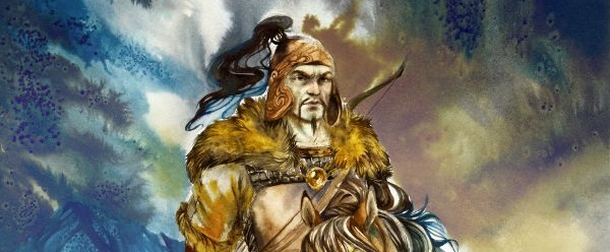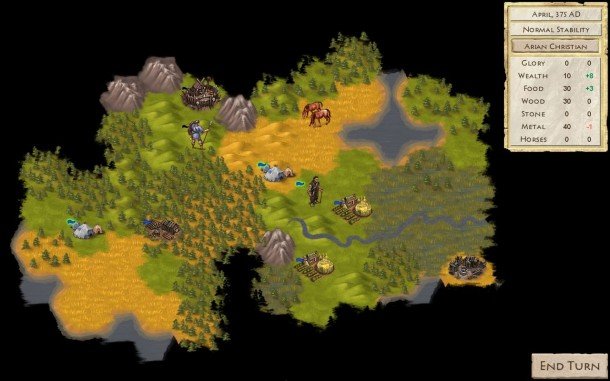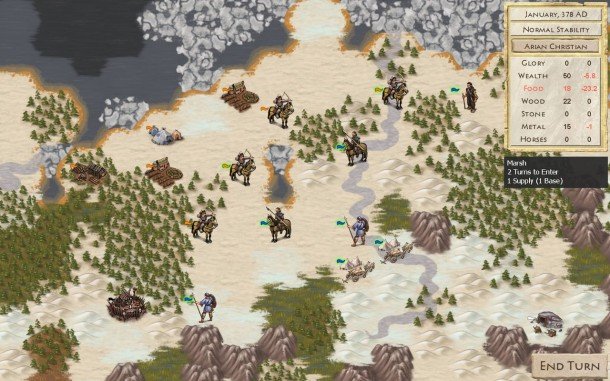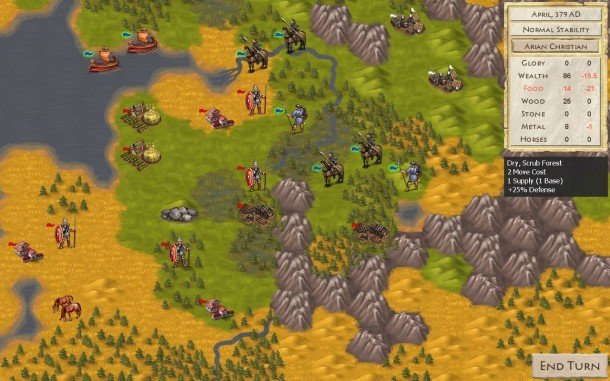
Civilization V designer Jon Shafer has come down from the mountains, into our frozen world, to reveal At the Gates . To develop it, Shafer's new studio, Conifer Games , is asking for $40,000 in funding on Kickstarter . Check out the video above for an overview of the game, then dive into some finer details in our interview with Shafer below.
PC Gamer: I noticed you have unit stacking implemented right now. This was famously absent from Civ V, and personally, I was one of the people that really loved the more tactical warfare that model allowed. What was the reasoning behind bringing unit stacking back for At the Gates?
"Think of it as a well-developed game of chess..."
Jon Shafer: The focus with warfare in At the Gates is supply. Every tile has a supply rating which is based on the type of terrain and whether or not it's within supply range of one of your settlements or supply camps. Timing when your invasions take place is critical, and success usually comes down to holding out or cutting off the enemy's supply, rather than building a front line (a'la Civ 5) or who has the biggest stack of units (a'la other 4X games). Think of it as a well-developed game of chess where each side is waiting for the other to provide an opening, and once one is exploited resolution comes fairly quickly.
One of the big reasons why I went this direction is to really play up the new seasons system. The weather had a huge impact on the way wars were fought, and I wanted to make sure combat took advantage of not just the mechanics in the game, but also had a nice tie-in to history.
Your tribe captured a stronghold at one point in the video. What benefits do these give you, and how do they differ from settlements and cities?
To be perfectly honest, I'm not really sure yet! They may turn into normal settlements at that point, they might just serve as trophies for your victory, or they could have some unique effect. Something I still have to figure out!

"I really wanted the economy to be much more strategic."
Is it possible to build new settlements (both mobile and immobile?)
Keep up to date with the most important stories and the best deals, as picked by the PC Gamer team.
It is. The Pioneer unit is able to build new settlements.
Can settlements "settle down" and become cities?
There will be ways for them to become fixed—for example, if you build walls. There will also be Romanization Perks that give you a bonus, but come with the drawback of your settlements becoming fixed to where they are. Roman cities are also obviously cannot move.
Do you need to stay in proximity to an improvement to benefit from it? Or can you gain resources from as many as you can defend?
The latter. The role of settlements is more limited than in other 4X games, in that they produce a small amount of wealth, serve as supply nodes and are able to build new units. But you're not going to be managing what tiles they're working or anything like that. I really wanted the economy to be much more strategic. There's a nice tension where you have to decide between moving on to new lands and protecting what you still have.
Does winter have an effect on the outcome of combat, beyond limiting supply?
The primary effect is definitely supply, but the changing of the terrain also affects defensive bonuses, movement costs, etc.
What are the benefits of holding a city (as opposed to strongholds and settlements)?
Roman cities produce quite a bit more wealth via taxes, and they're also eventually able to build special types of units that you can't from your plain ol' settlements.
Is it possible to build your own roads eventually? What benefits do roads offer?
Nope, no roads for you. The roads on the map are fixed from the start. They provide a movement bonus, as in other 4X games, but that's pretty much it.

What years are covered by the game?
The game starts in 375 AD, and will definitely wrap up within a hundred years. The specific dates and number of turns is still up in the air, as that will be determined by gameplay.
Something else I should note is that the turns in ATG are much more “dense” than in other 4X games. You have the seasons to consider, depleting resources to manage, diplomatic requests to watch for, etc. Production for most items is immediate, so you won't be hammering the end turn [button] ten times in order to finish things. You really want to be paying attention at all times!
Can you tell us anything about the other playable leaders besides Attila?
The final list hasn't been nailed down yet, but the goal is to make them very distinctive from one another. Everyone has an idea of Attila in their head, but this is obviously a period of history that few people are really familiar with. That's great in a sense because it gives us some room to play around with ways of differentiating them, but it also necessitates that in a way, as Fritigern is a whole lot less well-known than, say, Julius Caesar.
Do specific tribes have special abilities, such as North Germanic bands being more equipped for harsh winters?
Absolutely. This ties heavily into the idea of each faction being very unique. As you noted, some tribes will be able to deal with the harsher seasons better. For the Huns I'm considering something very different, where they can't actually own any fixed improvements or cities, and can only acquire resources by moving around and pillaging. Still have to playtest it to make sure it actually works, but it sure sounds like fun!

"I didn't feel that a heavy emphasis on 'city' development would really make sense in this era."
How many climate zones are there?
At the moment there are seven ... I'll probably make the system more granular later when I have more time.
Does population play a role in the game?
It's required when training new units, and they provide wealth each turn but that's about it. As noted above, I really wanted the focus economically to be on your empire rather than specific locations. I didn't feel that a heavy emphasis on “city” development would really make sense in this era.
How many religions are in the game? Do they have any effects beyond diplomacy modifiers?
Just three: Nicene Christianity, Arian Christianity, and Paganism. Their effects are limited to diplomacy, so there's no missionaries, conversion system, etc. Religion certainly played a large role in this era, but it was mostly as a diplomatic and political tool. I didn't want to burden the game with a complex system when I felt I could get exactly what I wanted from it by keeping it as a fairly simple but still powerful diplomatic knob.
Can you make requests of other tribes, or manipulate them to fighting each other/your enemies?
The specific requests system showed in the video is limited to the AI players, but there are definitely ways to ask them for favors, alliances, etc. though, and their willingness is very much tied to your relations. Finding ways to get that number up is a big part of the diplomatic game.

How close is the art in the game right now to the final version?
The plan is for the game to be released in the first half of 2014 and most of the art development time is still in front of us, so I would expect it to change a fair bit. I couldn't say how exactly, as that will ultimately come out of the iterative process. One major difference is that the units and landscape will be animated, whereas right now they're obviously all static images.
How large is the map, in comparison to the total area shown at the end of the demo?
The video showed the entire map used in that game, but you'll be able to play on ones that are much larger if you'd like. Don't know what the exact dimensions will be yet, but it will be at least four times as big as what you saw there.
Is it possible to subjugate other tribes?
That's still up in the air. I certainly like the idea of it, but I have yet to come up with a design that I'm happy with. The trick is for it to be more useful than just conquering the tribe and running it yourself!
What does the Glory resource do?
Glory is basically your score. In order to win you have to have at least 500 Glory and capture either Rome or Constantinople. Not sure if that will remain that way in the final version of the game, but that's how it works right now at least!
Thanks to Jon for taking time out of coding and pillaging to speak with us. There's a bit more info available on the At the Gates official site .
Len Hafer is a freelancer and lifelong PC gamer with a specialty in strategy, RPGs, horror, and survival games. A chance encounter with Warcraft 2: Tides of Darkness changed her life forever. Today, her favorites include the grand strategy games from Paradox Interactive like Crusader Kings and Europa Universalis, and thought-provoking, story-rich RPGs like Persona 5 and Disco Elysium. She also loves history, hiking in the mountains of Colorado, and heavy metal music.

